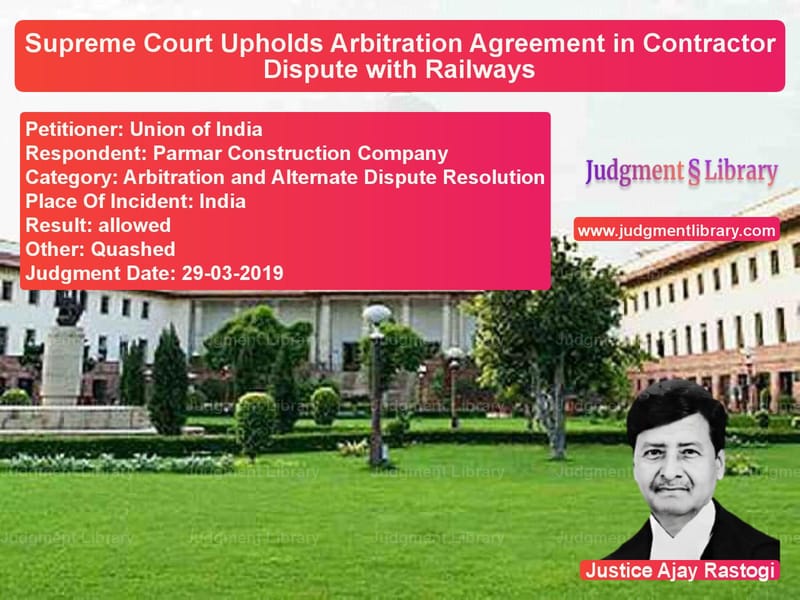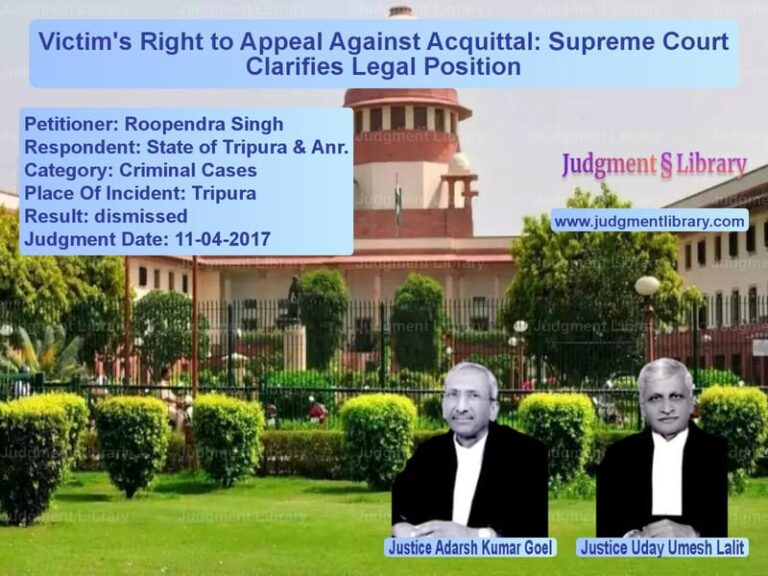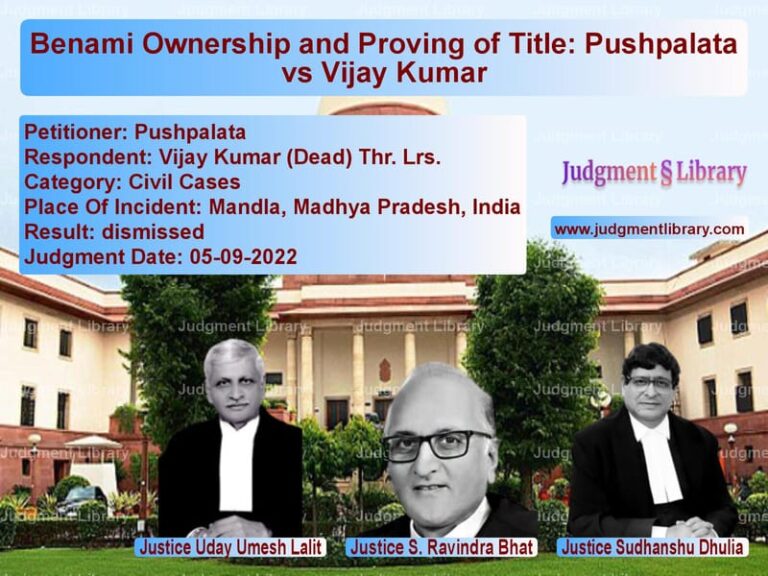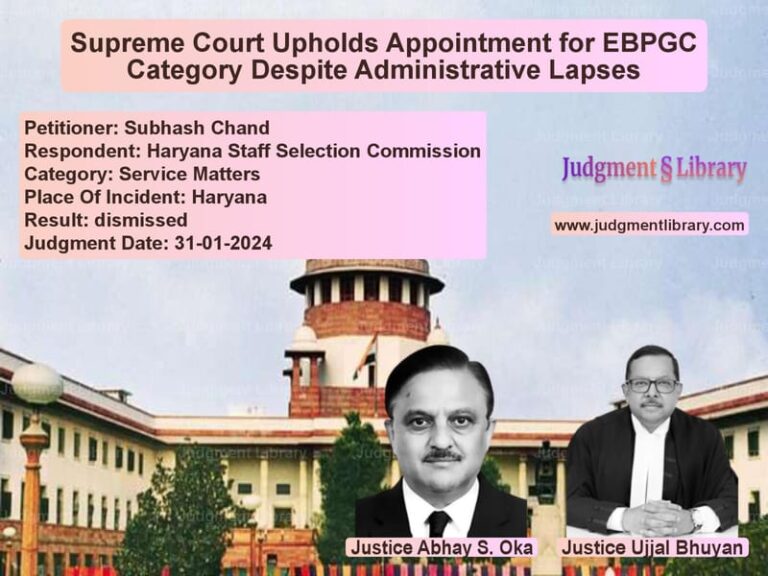Supreme Court Upholds Arbitration Agreement in Contractor Dispute with Railways
The Supreme Court of India has recently delivered a significant judgment in the case of Union of India vs. Parmar Construction Company and other related appeals, addressing key issues concerning arbitration agreements between contractors and public sector entities, particularly in railway contracts.
The Court examined whether the High Court was justified in appointing an independent arbitrator when a pre-existing arbitration agreement existed, the validity of ‘No Claim Certificates’ signed by contractors, and the applicability of the amended provisions of the Arbitration and Conciliation Act, 1996.
Background of the Case
The case involved a batch of civil appeals related to arbitration disputes between contractors and the Indian Railways. The contractors had undertaken various construction projects for the Railways, including bridge and road construction, office accommodations, and other infrastructure works.
The disputes arose due to the following reasons:
- Non-payment of final bills.
- Unilateral deductions made by the Railways from contractors’ invoices.
- Delays in releasing security deposits and escalation costs.
- Contractors being coerced into signing ‘No Claim Certificates’ as a precondition for payment.
The contractors invoked arbitration under Clause 64(3) of the General Conditions of Contract (GCC) and requested the Railways to appoint arbitrators. However, the Railways refused, arguing that the contractors had already furnished ‘No Claim Certificates,’ thereby forfeiting their right to arbitration.
As a result, the contractors approached the High Court under Section 11(6) of the Arbitration and Conciliation Act, 1996, seeking the appointment of independent arbitrators. The High Court allowed their petitions and appointed independent arbitrators.
Petitioner’s Arguments (Union of India)
The Union of India, represented by the Railways, argued the following:
- The arbitration clauses in the contracts explicitly required disputes to be settled by arbitrators nominated by the Railways, and the High Court erred in appointing independent arbitrators.
- Since the contractors had signed ‘No Claim Certificates’ while submitting their final bills, there was no outstanding dispute to be arbitrated.
- The provisions of the Arbitration and Conciliation (Amendment) Act, 2015, which introduced stricter neutrality norms for arbitrators, should not apply retrospectively to arbitration requests made before 23 October 2015.
- The High Court should have respected the arbitration mechanism outlined in Clause 64(3) of the GCC instead of directly appointing independent arbitrators.
Respondent’s Arguments (Contractors)
The contractors countered with the following points:
- The ‘No Claim Certificates’ were signed under financial duress, as contractors were compelled to submit them as a condition for receiving final payments.
- The Railways’ failure to appoint arbitrators, despite repeated requests, justified the High Court’s intervention in appointing independent arbitrators.
- The High Court correctly applied the principles of impartiality and neutrality in arbitration, as envisioned in the amended Arbitration and Conciliation Act, 2015.
- The refusal of the Railways to recognize disputes and appoint arbitrators amounted to an unfair practice, warranting judicial intervention.
Supreme Court’s Observations
The Supreme Court analyzed the legal principles governing arbitration agreements and the enforceability of ‘No Claim Certificates’ in contracts. The key observations were:
“The arbitration agreement between the parties must be honored unless there are compelling reasons to deviate from it. The mere existence of a ‘No Claim Certificate’ does not automatically preclude arbitration, particularly if there is prima facie evidence that such certificates were obtained under coercion or duress.”
On the issue of arbitrator appointment, the Court held:
“The High Court was not justified in appointing an independent arbitrator without first ensuring that the procedure outlined in Clause 64(3) of the GCC was followed. Only if the designated arbitration mechanism failed to function impartially or within a reasonable timeframe could the High Court intervene.”
The Court also clarified that the amended provisions of the Arbitration and Conciliation Act, 2015, would not apply retrospectively to arbitration requests made before 23 October 2015.
Final Judgment
The Supreme Court ruled in favor of the Union of India, holding that:
- The High Court’s orders appointing independent arbitrators were quashed.
- The Railways were directed to appoint arbitrators as per Clause 64(3) of the GCC within one month.
- Contractors were allowed to submit their claims to the appointed arbitrators, who would decide the disputes without being influenced by prior judicial observations.
The Court emphasized that arbitration should proceed as per the contractual agreement, and judicial intervention should be limited to ensuring fairness and due process.
Implications of the Verdict
This judgment has significant implications for arbitration in government contracts:
- Reinforcement of Contractual Arbitration: The ruling underscores the importance of adhering to pre-agreed arbitration clauses, limiting judicial interference in arbitrator appointments.
- Clarification on ‘No Claim Certificates’: The Court acknowledged that such certificates could be disputed if obtained under coercion, ensuring contractors are not unfairly deprived of arbitration rights.
- Retrospective Application of Arbitration Amendments: The decision clarifies that the 2015 amendments to the Arbitration Act do not apply to arbitration proceedings initiated before 23 October 2015.
- Timely Resolution of Disputes: The Court directed the Railways to expedite arbitration proceedings, preventing undue delays in dispute resolution.
By reinforcing arbitration agreements while safeguarding contractor rights, this ruling sets an important precedent for handling disputes in government contracts.
Petitioner Name: Union of India.Respondent Name: Parmar Construction Company.Judgment By: Justice Ajay Rastogi.Place Of Incident: India.Judgment Date: 29-03-2019.
Don’t miss out on the full details! Download the complete judgment in PDF format below and gain valuable insights instantly!
Download Judgment: Union of India vs Parmar Construction Supreme Court of India Judgment Dated 29-03-2019.pdf
Direct Downlaod Judgment: Direct downlaod this Judgment
See all petitions in Arbitration Awards
See all petitions in Dispute Resolution Mechanisms
See all petitions in Institutional Arbitration
See all petitions in Judgment by Ajay Rastogi
See all petitions in allowed
See all petitions in Quashed
See all petitions in supreme court of India judgments March 2019
See all petitions in 2019 judgments
See all posts in Arbitration and Alternate Dispute Resolution Category
See all allowed petitions in Arbitration and Alternate Dispute Resolution Category
See all Dismissed petitions in Arbitration and Alternate Dispute Resolution Category
See all partially allowed petitions in Arbitration and Alternate Dispute Resolution Category







